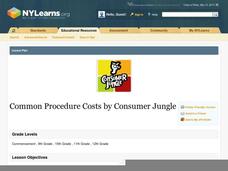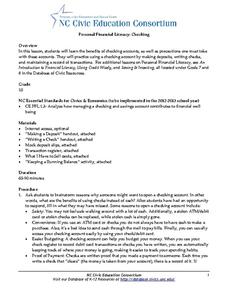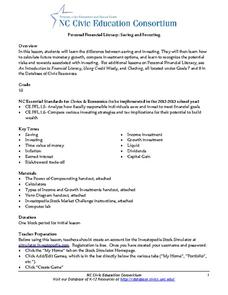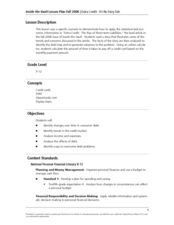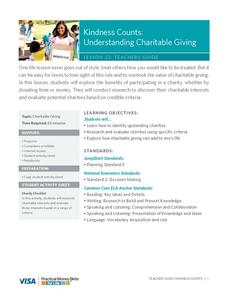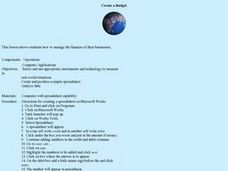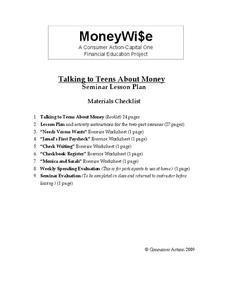Curated OER
Common Procedure Costs
Kids never think about the cost of medical expenses, because they never think they'll get hurt. To better understand personal financial planning, learners research common medical procedures and their costs. They use a worksheet and the...
Carolina K-12
Personal Financial Literacy: Using Credit Wisely
What is credit, and what are its advantages and disadvantages for purchases? Your class members will learn about different types of loans, such as student and mortgage, how interest factors into credit use, credit reports, and ultimately...
Center for Literacy and Disability Studies
Personal Financial Literacy: Checking
After researching local banks and the checking account benefits offered by each, class members practice filling out a deposit slip, writing a check, and keeping a transaction register.
Carolina K-12
Personal Financial Literacy: Saving and Investing
When should you save, and when should you invest? In considering this question, your class members will also learn about the time value of money, inflation, compounded interest, and income/growth investments. The resource also outlines...
Curated OER
After 6 Months of Financial Dieting
Explore the concept of financial planning by reading an article about 5 families and their plans to save money. Students discuss the progress each family made financially after three months, and then make their own financial plan.
Visa
Making it Work Together: Money and Roommates
Balancing money and first-time roommates can feel like a daunting prospect. Support your class members in understanding how financial agreements between roommates function, as well as the underlying importance of how to communicate about...
Curated OER
Extra Credit: It’s No Fairy Tale
Learners discuss their knowledge of payday loans and credit cards. In this Economics lesson, students complete a read an article and Q&A activity in groups, and play a vocabulary bingo game and a quiz game on payday loans. Learners...
PricewaterhouseCoopers
Planning and Money Management: Financial Plan
More planning goes into a budget than a high schooler thinks. Here, they learn about the expected expenses and incomes, along with outside factors such as natural disasters. Learners prepare their own budget and adjust it based on the...
Visa
Credit
What are the advantages and disadvantages of having a credit card? Don't miss this important life skills and financial literacy lesson, which focuses on consumer responsibilities, creditworthiness, and establishing a credit history.
Curated OER
Financial Contracts
Prepare your class for the real world and learn the basics about credit and the principles behind using it wisely. The activity includes handouts that explain the necessary vocabulary and concepts to understanding credit. After reviewing...
Practical Money Skills
Budgeting Your Money
How do you make sure that your income doesn't disappear before you have a chance to save it? Use a creative budgeting activity to teach learners in both special education and mainstream classes how to keep track of their expenditures and...
Federal Reserve Bank
Lesson 2: In the Aftermath
Don't wait for a crisis to get your finances together. An economics lesson demonstrates the importance of understanding crucial documents, banking basics, and financial tools with the focus on Hurricane Katrina in 2005 and its effects.
Visa
Kindness Counts: Understanding Charitable Giving
Financial literacy is generally focused on personal spending and saving, but consider an opportunity to talk to your pupils about how charitable giving can also factor into money management and how it can enhance life for both oneself...
Curated OER
Family Forms and Family Life Cycle
There are so many different types of families, and each family functions in a different way. Discover the different roles, responsibilities, and relationships that develop in different family types. The lesson provides you with five...
Curated OER
Meet Molly An American Girl
Learners examine concepts of personal finance. In this personal finance instructional activity, students use Valerie Tripp's, Meet Molly, An American Girl, to learn about saving and spending after World War II. They compare financial...
Curated OER
Spend, Save, Invest or Donate (9-12)
High schoolers explore the concept of personal finance. In this philanthropy lesson, students examine decisions they make about money as they discover the definitions of philanthropy, resources, scarcity, choice, benefits, costs,...
Curated OER
Create a Budget
Students develop a budget spreadsheet to manage finances for their business. In this finance instructional activity, students use a spreadsheet program to create a budget with credit and debit columns. There are step-by-step directions...
Consumer Action
Talking to Teens About Money
Your teenagers are probably very good at spending money, but how good are they at managing it? Teach class members about banking, checking accounts, interest rates, car insurance, and many other relevant concepts with a series of...
Federal Reserve Bank
Savvy Savers
What are the benefits and risks of saving in an interest-bearing account? Pupils explore concepts like risk-reward relationship and the rule of 72, as well as practice calculating compound interest, developing important personal finance...
Texas Education Agency (TEA)
Legal Responsibilities of Financial Exchanges
Let's stock up on knowledge! With lecture and discussion, pupils explore the legal responsibilities of monetary exchange. Scholars then research laws about financial exchange in the stock market and create a poster to illustrate their...
Curated OER
Scoring a Financial Education
Learners explore the concept of money management. In this money management instructional activity, students read an article about learners taking a finance course in high school and college. Students discuss the importance of money...
Curated OER
Money Management
Learners choose an occupation and set up a paper family and household. They create a monthly budget, pay monthly bills and file taxes. They practice math skills using financial information and view money as a resource. They create an...
PricewaterhouseCoopers
Paying for College: Finding the Right Fit
Most want to attend college, but do they know where? How will they afford it? How do they apply? Learners discover the costs associated with college and the best way to budget and possibly apply for financial aid.
Visa
Smooth Sailing: Exploring Insurance and Estate Planning
While purchasing insurance and estate planning may seem like a rather irrelevant topic for high school students, introducing this concept now can help your learners develop a solid foundation of financial literacy that will support...


